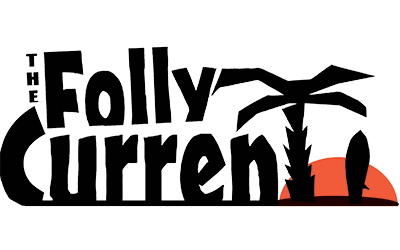The Power of Petition
by Jenny Peterson | Current Staff Writer
The polarizing issue of whether or not to put a cap on the number of short-term rentals on Folly Beach will likely be put on a ballot in a referendum for voters to decide. The likely vote at the polls is thanks to a citizen-led petition to cap short-term rentals to 800 licenses on non-primary residences.
The petition got 495 signatures—well over 15 percent of voters on Folly Beach.
Per state law, if 15 percent of valid registered voter-residents sign a petition, the council can vote on the ordinance as written in the petition outright or send it to a referendum for voters to decide at the polls.
Folly Beach Mayor Tim Goodwin said he believes council will vote to put the decision into resident-voters’ hands.
The Charleston County Election Commission is currently reviewing all the signatures to verify the names and addresses and will send results to council likely in late December.
Isaac Cramer, executive director of the Charleston County Elections Commission, said based on the last municipal election, the 15 percent threshold on Folly Beach would be satisfied with 370 valid signatures.
If council votes to send the issue to a referendum for voters to decide, a date for when voters would go to the polls would be discussed and determined, but must be held within a year of council deciding to put the issue to a referendum, Cramer said.
Pushing for a Petition
The petition was created by John McFarland through a group named Save Folly’s Future following council’s voting down an ordinance this past summer to cap non-primary short-term rentals at 800 licenses for non-primary residents.
In May of this year, it was reported by city staff that there were 1,019 fully-licensed and registered short-term rentals on the island and 2,600 total parcels. That number was up from 993 in 2019, according to city administrator Aaron Pope. A Short-Term Rental committee was created specifically to discuss issues surrounding short-term rentals.
Goodwin proposed a cap at 800 licenses for non-primary residences at a special council meeting on June 28, but it failed 2-5. Goodwin voted in favor of the cap along with councilmember Katherine Houghton. It was voted down by councilmembers Adam Barker, William Farley, Billy Grooms, D.J. Rich, and Eddie Ellis.
A separate vote on a moratorium on new short-term rentals licenses was also voted down by council in June along the exact same lines.
The citizen-led petition is stricter than the council’s failed ordinance on the cap.
In the petition, the 800 cap on short-term rentals would not apply to full-time residents who rent any space in their primary residence for 72 days per year.
If a resident has a separate unit on their property—even if they live on the grounds—they would be subject to the cap.
In preparation for the likely referendum being sent to voters, the council voted at a special meeting Oct. 18 to put a three-month moratorium on issuing new short-term rental licenses, with only council member Eddie Ellis voting against the moratorium.
Pope said if the cap is enacted—either by council or voters—it is projected to take about two years for Folly’s short-term rental licenses on non-primary properties to fall to 800, down from the roughly 1,100 licenses currently for non-primary residences, either when properties sell and licenses don’t convey, licenses are not renewed or licenses are revoked.
Taking sides
The issue of short-term rentals has divided the Folly community on social media and during public comments at council meetings.
Many residents say that the proliferation of short-term rentals, like Airbnb and VRBO, has impacted their quality of life with added constant noise, trash, and a revolving door of strangers as neighbors. Advocates of the cap say that unlimited short-term rentals are displacing long-term renters as property owners take advantage of more lucrative opportunities at the detriment of the neighborhood and thinning the local employee pool.
“When I initially proposed (the ordinance on a cap) we were already at about 40 percent of the total island being short-term rentals,” Mayor Goodwin said. “Where do you want to put on the brakes for the residents who want to raise their kids (here) versus just outside investors making rental profit? I thought it would calm down a number of rentals and maybe bring some civility, since Folly Beach doesn’t have a ‘rental zone.’”
Goodwin believes the short-term rentals are driving out long-term renters.
“People complain all the time about how there’s no place for people to rent that work out here that want to live out here. The reason there’s no place for long term rentals is because they’re all turned into short term rentals,” Goodwin said “Some of these crazy (home) price prices are being driven by investors. If you go back and look at most of the people who have voiced concerns against this cap, I would say 95 percent of the people are in the real estate business or short term rental investors that don’t live here.”
Those opposed to the cap said it would negatively affect property values, including how short-term rental licenses wouldn’t be able to be transferred to heirs if they took over as owners. A group called Folly United was created to oppose the petition and cap.
Stratton Lawrence, a Folly resident, said a cap on short-term rentals would prevent younger families like his from getting the opportunity to move to the island.
“I could name a dozen families right now that are living on Folly Beach only because we pulled together big loans with numbers that made sense because we could do (short-term rentals) and knowing that this asset would have this value that we could sell if we ever needed to,” Lawrence said. “Once property values hit a certain mark, long term rentals aren’t viable for any kind of working class of people. Folly Beach was one of the last beaches on the East Coast that had that. A little brick ranch house costs me $5,000 a month to own. What long-term renter could cover my mortgage, let alone let me make money off it?”
Lawrence fears a cap on short-term rentals would mean that smaller beach cottages and homes on the island would be torn down and replaced.
“An old house as a short-term rental has value, but if it can’t transfer as a short-term rental, I see it getting torn down and immediately going to lot value,” Lawrence said. “I think there’s a ton of houses like that; if you can fix them up and short-term rental them, there’s value. But if somebody is buying a house that is a vacation house just for their family, they’re going to tear these little houses down. The type of buyer will change. You’re not going to get scrappy, young entrepreneurial families like ours.”
Elton Culpepper, a realtor and Folly Beach resident, said there’s no doubt a cap on short-term rentals would impact property values.
“The petition says if there’s a cap, then less investors will be interested in buying on Folly. But on the other side of the coin, that means that property owners won’t be able to get as many people interested in their property,” Culpepper said. “When they go to sell that property, they have limited the pool of who’s going be able to buy their property.”
Culpepper said that many of the concerns residents have over short-term rental quality of life issues, like noise and trash, have already been addressed with a recently-passed strict policy to enforce existing laws, hiring code enforcement officers and a “three strikes you’re out” policy for violations that would result in losing a license.
Possible considerations for the future
Officials confirm that if the referendum on the cap is passed, there would be room for amendments.
“It would be just the same as any other law,” Pope said. “It could be amended the next month.”
The City of Charleston, for example, allows short-term rentals for residents for any units on their property, primary or not, as long as they live on the grounds.
Pope adds, “If it goes to a vote, it’s going to be interesting to see what the margin is. If it comes in 51 to 49 one way or the other, the next month you may have everyone on the ‘losing’ side come in and say, ‘That’s not a majority, put it back on the agenda or amend it.’ I’m not confident a referendum will necessarily ‘settle’ the issue.”
Goodwin reiterated that the petition is not created by the council and that residents should voice their opinions—good or bad—at the voting booth.
“You don’t need to write council emails about the petition. If it gets certified that they have enough names, it’s going to go to a vote,” Goodwin predicts.
Anyone can read the petition as written by visiting www.savefollysfuture.org.


